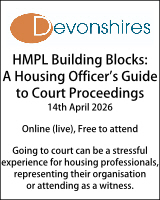High Court judge tells council to issue fresh Housing Needs Assessment and Personal Housing Plan
- Details
The High Court has found against the London Borough of Waltham Forest on one of four grounds argued by claimant AA in a judicial review challenge concerning a personal housing plan.
Deputy High Court judge Susie Alegre found it had been unreasonable for Waltham Forest to fail to include steps to support AA in her application for social housing under the plan. The deputy judge also criticised aspects of the council’s conduct of its case.
She did though dismiss claims that there is no suitable alternative remedy to challenge plan under s.189A of the Housing Act 1996; alleged failure to consider an email from the Single Homeless Prevention (SHP) service in the housing needs assessment and alleged failure to discharge the Tameside duty of inquiry.
AA is a 28-year old woman from Yemen, who was granted refugee status in November 2023 having suffered rape and domestic violence and who has a diagnosis of complex post traumatic stress disorder, for which she receives regular therapy sessions.
She was evicted from Home Office accommodation on being granted refugee status and Waltham Forest accepted it owed the initial duty under section 189B of the Housing Act 1996 .
It referred her to SHP, which has been contracted by the council to assist applicants to draw up personal housing plans.
Ms Alegre said four issues arose before her:
- Does the reviews and appeals process contained in Part 7, Housing Act 1996 provide a suitable alternative remedy to rectify alleged errors in the performance of the assessment and planning duties in section 189A, Housing Act 1996?
- Did the decision-maker fail to have regard, or adequate regard, to an email from SHP when assessing AA’s case under section 189A, Housing Act 1996 concerning her need for self-contained accommodation?
- Did the council fail to discharge its duty of inquiry when assessing AA’s case and producing a written plan under section 189A, Housing Act 1996?
- Are steps to be taken by a local housing authority to secure social housing for the homeless applicant within the scope of section 189A(4)(b) and (6)(c), Housing Act 1996?
Waltham Forest argued that AA had alternative remedies to these proceedings.
But Ms Alegre said: ”I can understand why a local authority might wish that the statute did provide such an alternative remedy in these cases.
“However, wishing that the law was so does not make it so. The legislation is explicit about what is covered by the review under s.202 and appeal under s.204. It does not include s.189A assessment or planning.”
She added that it was not her role “to unilaterally expand the existing law by excessive statutory interpretation in such a way” and concluded there was no suitable alternative remedy to challenge the assessment or plan drawn up under s.189A in the absence of an offer of accommodation.
This meant “there is, therefore, no suitable alternative remedy in this case”.
Ms Alegre said that while social housing allocation falls under Part 6, the duty to secure suitable accommodation, of whatever kind, arises out of s.193(2) under Part 7.
She said: “It is not logical to exclude the kinds of support that could be provided to secure allocation under Part 6 from the steps included in the PHP.
“This is because allocation of suitable accommodation under Part 6 is one of the routes to bringing the housing duty under Part 7 to an end. Therefore, steps to support the claimant to secure allocation under Part 6 are, in effect, steps taken to discharge the duty under Part 7.”
This meant that where someone requires support from a local authority to apply for accommodation under Part 6, “it would, therefore be unreasonable to exclude such support from the steps set out in the PHP under Part 7.
“In the circumstances I find that it was unreasonable for the defendant to exclude such support from the PHP alongside the steps related to private sector rental accommodation.”
Ms Alegre said Waltham Forest should now issue a fresh PHP under section 189A(6) of the Housing Act 1996.
She then considered whether AA should have costs paid as the successful party.
Waltham Forest argued that where a successful party has raised issues or made allegations that have caused a significant increase in the length or costs of the proceedings any cost award to them should be reduced, whether or not the claimant acted unreasonably or improperly.
Ms Alegre said: “While she was not successful on all grounds, I consider that the claimant was successful overall and is the successful party in the litigation. I do not find any of the points brought on behalf of the claimant to be unreasonable.”
She noted Waltham Forest’s “heavy reliance on the defence of suitable alternative remedy which I have ruled was not legally sustainable.
“Without this argument, the hearing would have been significantly shorter, and the level of legal argument would have been much less.”
Ms Alegre ordered that Waltham Forest should pay AA’s solicitor £10,000 plus VAT.
Mark Smulian
22-10-2025 4:00 pm
05-11-2025 4:00 pm
13-11-2025 9:30 am
18-11-2025

























